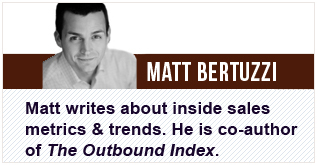For some time, I’ve had a thorn in my side about a particular ‘insight’ floating around the sales punditry.
I’ve grumbled when it was repeated on conference stages, scowled reading it on blogs, and I might have exclaimed ‘for {#$%s sake‘ when I found in Dan Pink’s (otherwise) excellent To Sell is Human.
But earlier this week, I heard it from a young Inside Sales Rep as a ‘justification’ for not picking up the phone. That did it. I’m as mad as hell and I’m not going to take this anymore!
Here’s what he said:
I don’t believe in outbound calling. Maybe years ago, when sales reps had more info than prospects, it made sense.
Now, the buyer is educated and has all the power – better to wait for them to come to me.
This essentially a parroting of the information assymetry idea: that pre-web we lived in an era of tyrrany where sales ruled over buyers mercilessly.
I’ll even admit getting caught up in this line of thinking. I reasoned, “Wow, the internet really has changed things. Buyers have access to pricing, customer reviews, competitive comparisons, the works.”
 But then I did something crazy.
But then I did something crazy.
I went and asked a few folks who had been in sales for 20+ years. Their response: What the hell are you talking about? It was, does & will take two to tango.
Here’s why.
BACK THEN: Buyers had plently of information that Sellers didn’t
In the prehistoric age (pre-2003), Buyers had figuratively tons of information that Sellers couldn’t access (company financial performance, org charts, new strategic priorities, leadership changes, technologies in use, on and on and on).
To get this information, sellers had to ask the buyers to share it. To my mind, that era of Sales domination never existed.
NOW: The magic weapon that Buyers are using – Sellers can use too
Yes, Buyers can access a litany of information about my products, my company, my competitors, my magic quadrant, etc.
But I can use that same exact tool – the internet – to learn about them. In under 15 minutes, here’s what I can do:
- Listen to their last earnings call
- Read strategic guidance on their stock price
- Find quotes from their CIO and CMO
- Gather the technologies in use at their company
- Learn what types of roles they are hiring for and where they are expanding
- Read reviews of their comp & culture from dozens of current + former employees
- See what emails they open, pages/video/presentations they view
- Capture the titles, tenure, role & contact information of just about anyone in their organization
Seems pretty symmetrical to me.
Net net: the more things change…
I’m not suggesting that exactly what worked 20 years will work today. But to any Reps hesitant to pick up the phone, I offer this:
Stop worrying about who has “all the power.”
Your buyers want to build better businesses, go help them do that.
Find the right information to start a conversation.
Context matters.
She who sets the vision, bends the sale in her direction.
Sell for competitive advantage.
Your competition has access to the same tools you do – so remember Audaces fortuna iuvat.
Think I’m totally off base? Let me know in the comments below.




Matt: I agree with your observation about customer information power, and similarly, have found the idea blown out of its original form, its meaning warped and misinterpreted.
I think the idea started out simply enough: “Customers have access to information they didn’t previously have. Consequently, they have the capability of becoming better informed.” No problem there, but then the confusion started, ending up where many think it is today: “the buyer is educated and has all the power.” –the assumption being that access to information = understanding. Not! Access to information = access to information. Draw any inferences at your own risk.
Buying and selling anything has always depended on information imbalances. Like you, I think salespeople are better off not assuming they’re at an information disadvantage right out of the gate – that leads to poor tactics. A related blog I wrote on this topic is on CustomerThink, Customer Information Power: An Obvious Illusion.